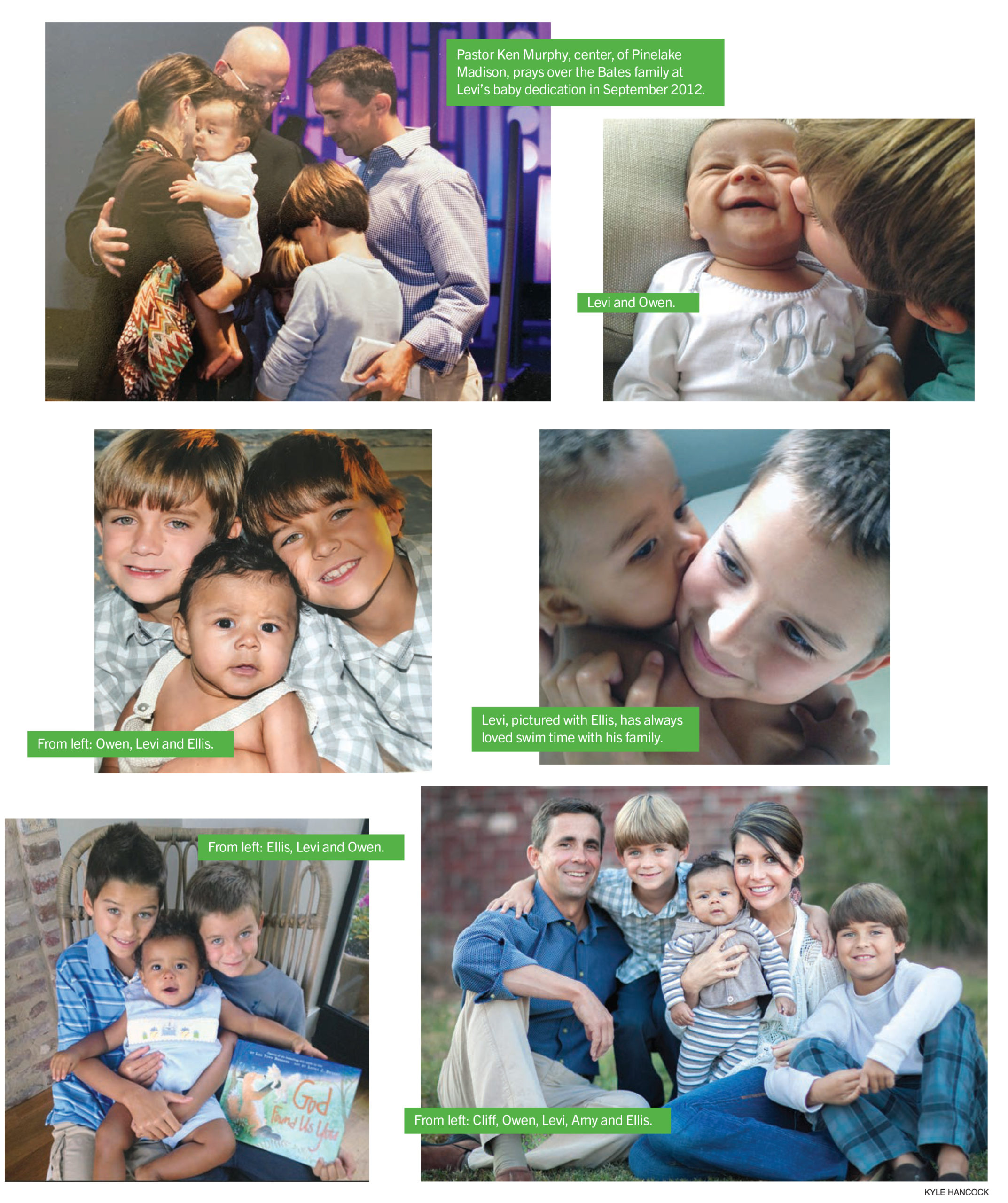by KATIE EUBANKS
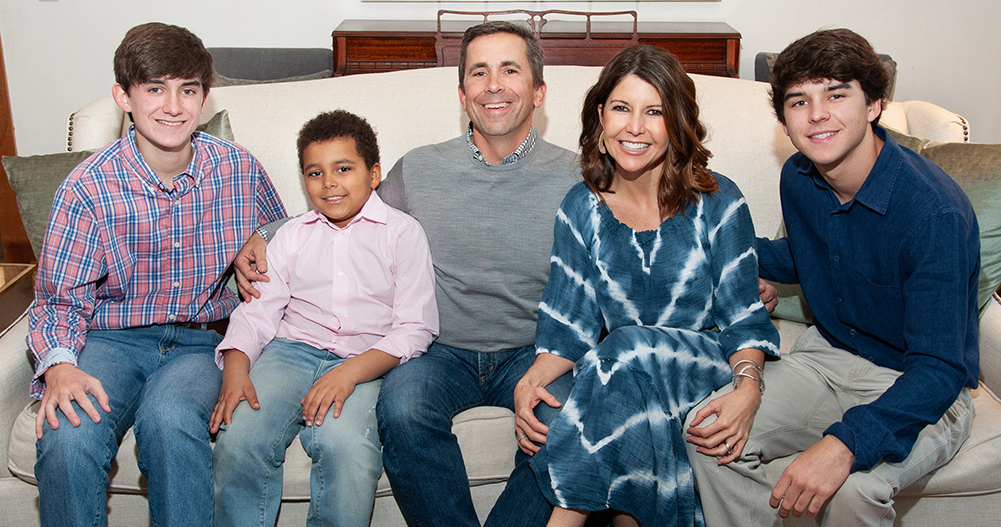
From left: Owen, Levi, Cliff, Amy and Ellis Bates at home in Ridgeland.
‘We’re God’s adopted kids’
How Amy and Cliff Bates went from ‘easy street’ to mixed-race adoption
Seven-year-old Levi Bates appears, for a second, at the front door of the house — he’s a flash of pink button-down, blue jeans, brown skin and dimpled smile — and turns and darts away.
Now he’s chunking small basketballs into an arcade-style hoop. Yes, it’s set up right there in the front foyer. And yes, he is showing out.
His mother, Amy, laughs. She doesn’t seem to mind the big hunk of plastic interrupting her décor. After all, boys live here.
A couple years ago at the beach, another child asked Levi, “Why are you so brown and your family is white?”
“Because God painted me this way,” Levi replied.
That is both the complete truth and the tip of the iceberg.
‘That’s youth right there’
Amy and Cliff Bates met in the mid-’90s at the University of Mississippi, when Amy was a junior.
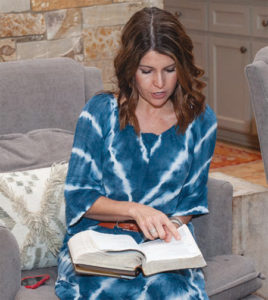
Amy points to a scripture that has been meaningful to her and Cliff. One of their favorite verses is Psalm 115:1, which begins, “Not to us, LORD, not to us but to your name be the glory.”
“When I met Cliff, he was not a believer, and I was not living like one,” Amy says. (“I certainly contributed to that,” Cliff adds.) When Amy graduated, she broke up with him, moved to Nashville, got involved in a church and rekindled her faith.
“I continued to write him letters, and sent him scriptures, how to be a Christian … I prayed for him the whole time,” she says.
“Eight months after we broke up, he called me on the landline … He said, ‘I wanted to ask Jesus into my heart, and I wanted to be with you when I did it.’ He drove four hours each way (to do that).”
“That’s youth right there,” Cliff says.
They didn’t get back together immediately — “I wanted to see if (his faith) was real,” Amy says — but she soon saw conviction in him where there’d been none before. By 1999 they were engaged, and in 2000 they were married.
They settled in the Jackson area. Amy started out as a kindergarten teacher, and later became a stay-at-home mom as they had two sons: Ellis in 2003, Owen in 2005. Cliff was a real estate developer. Life was good.
And “we were completely done (having kids),” Cliff says.
‘We weren’t getting any younger’
But they went on mission trips. They saw poverty and hopelessness. Then, they were asked for a favor: Would they host a few boys from the African Children’s Choir while they were in town? Another family had to cancel.
“Sometimes our ‘no’ is someone else’s yes,’” Amy says. “During that time (when we kept the boys), God started whispering the word ‘adoption’ to my heart. (But) I didn’t want to say anything to (Cliff) until I was sure.”
She prayed for a month, and then one evening she went and sat down beside her husband. “I couldn’t even get the words out. I was crying,” she says. (“I had no idea what she was about to say,” Cliff recalls.)
Finally, Amy told him, “I don’t know if God’s asking us to adopt, but He’s definitely asking us to pray about adoption.”
Cliff had felt a bit of a tug in that direction as well. They prayed about it for a year. “It was the first time in our marriage where we had had to really come together and pray for something major,” Amy says.
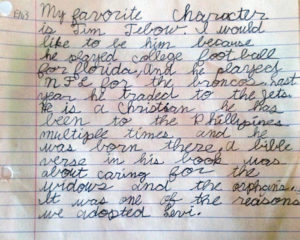
Ellis wrote this paper in school about his favorite “character,” Tim Tebow, and how Tim’s words inspired the adoption of Ellis’ little brother Levi.
Throughout that year, God kept putting adoption in front of them, whether in the form of a sermon or actual adoptive parents.
Then one day, “I had been journaling in the morning and asking for clear confirmation,” Amy says. “And it came from our oldest son, Ellis. I was just making breakfast. The boys had no idea we were praying about this. Ellis was reading Tim Tebow’s book ‘Through My Eyes,’ and he (told me that) Tim Tebow’s parents taught him the importance of caring for orphans and widows, like it says in James (1:27).”
Around that same time, Cliff says, “it became clear that if we said no, it would be clear disobedience (to God’s will for our lives). And, we weren’t getting any younger.”
‘Speechless’
God gave them a longing for another child. But they were also scared. “We’re human,” Amy says.
“I had a dream one night that I was in an orphanage, and I felt all this fear. I was overwhelmed. At that time, we didn’t know if we were going to adopt internationally or domestically, and I was afraid of doing the wrong thing. And at 4 a.m. God wakes me up from that dream with the loudest whisper that repeated over and over: ‘Perfect love casts out fear.’ From then on, I had no fear.”
The Bateses decided to say yes to wherever God led them. As they sought the Lord (and Google), they initially felt called to Honduras. They even put down a large hunk of money toward adoption there. They requested not to be matched with an infant.
While waiting to be matched, they were asked to foster a local baby who was biracial. The birth mother ultimately decided to keep her child – but now Amy and Cliff felt redirected. Once again, they consulted Google.
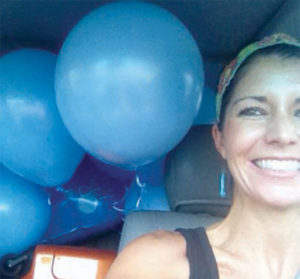
Amy and Cliff bought blue balloons to surprise Ellis and Owen with the news they were getting a baby brother.
They found a domestic adoption agency that had an urgent need for couples to adopt mixed-race babies. The agency said that after the Bateses completed their home study, they’d have a baby in less than six months.
“Six months turned into two weeks,” Cliff says. In summer 2012, the agency told them about a biracial baby boy about to be born in Augusta, Georgia. Cliff and Amy prepared to leave Jackson at any moment.
That night, “at 3:30 (a.m.) I had woken up and been praying for (the baby),” Amy says. He was born shortly thereafter, and at 5 a.m., she and Cliff started the 10-hour drive to Augusta.
When they got to hold Levi at the hospital, it was “instant love,” they both say. Amy didn’t bother wiping away the happy tears for her first-ever photo with her new son.
The Lord also gave her and Cliff the opportunity to love on Levi’s birth mother.
“The agency had cautioned us about how much of our faith we share (with the birth parents), because we don’t know where they stand,” Amy says. “(But) the Lord gave (me and the birth mom) an instant connection.”
After taking Levi to another room to bond with him for a couple hours, Amy and Cliff returned and found the birth mother sitting in a rocking chair. She asked them to pray for her.
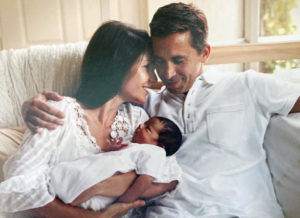
“It was the first time we had had to really come together and pray about something major,” Amy says of the decision to adopt.
“Cliff went immediately and stood behind her and put his hands on her shoulders, and I got to kneel in front of her and put her head on my shoulder, and tell her how precious she was to Jesus, and how much He loves her,” Amy says. “She said no one had ever told her that before.
“There aren’t many times I’m speechless in life, but we were speechless after that.”
Cliff and Amy had to stay in Georgia for 10 days in case the birth parents changed their minds. But “we didn’t feel any anxiety at all,” Cliff says.
“It wasn’t necessarily that she wouldn’t change her mind, but we just trusted God’s plan (regardless),” Amy says.
“(When) we went to do the paperwork with the social worker and the birth parents, we got to pray in a circle with Levi right there. … We never thought about the birth parent being a major part of our time there, but it was.”
The Bateses also have the freedom to contact the birth parents later, thanks to a semi-open adoption.
Oh, and all that money Cliff and Amy had put toward the Honduran adoption? That money offset the costs for another adoptive family.
“God went before us and behind us … and He provided for that family as well,” Amy says.
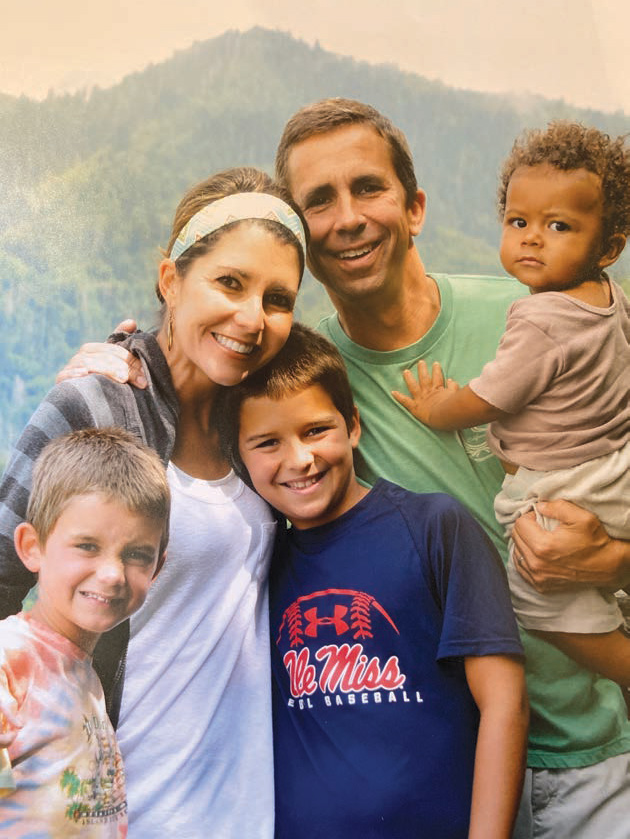
Celebrating baby Levi’s first birthday in July 2013 in Gatlinburg, Tennessee.
‘We’re God’s adopted kids’
Just like that, in July 2012, the Bateses were a family of five.
The hardest part about being adoptive parents, Amy says, “has been trying to communicate to Levi, in language that he understands, about being adopted and what that means.
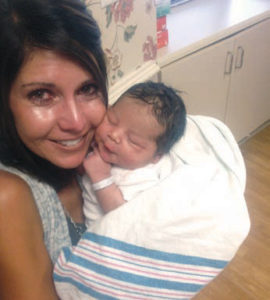
Amy’s first photo with Levi, in Augusta, Georgia.
“We were counseled before we adopted to be open with him from the beginning, so it is all he will know, but when he’s your son and you look into those eyes and that face you love so much, it is a difficult thing to explain.”
What about the easy part?
Cliff says that before adopting, he wondered if he’d be able to love an adopted child as much as he loved Ellis and Owen. But there’s no question that, “in our eyes, there’s no difference,” Cliff says. “God completely covers that. I don’t look at (Levi) and think the word ‘adoption.’”
Amy agrees wholeheartedly and says becoming Levi’s mother has helped her see how much God loves His children in Christ. When a person puts their trust in Jesus, God adopts him or her into His family. Just as Amy and Cliff love Levi as much as they love their other boys, God loves every believer as much as He loves His only begotten Son.
“Levi was 4 months old. I was just staring at him, and out of the blue, God says (to me), ‘Don’t you understand? I love you like (I love) Jesus.’ And that’s in His Word, in John 17:26. Mind-blowing. We’re God’s adopted kids.”
Ellis and Owen are 16 and 14. Ellis plays baseball and basketball, and Owen performs in show choir (when there’s not a coronavirus pandemic on the loose). They tease their little brother; play basketball with him in the foyer; put him in gentle headlock.
Ellis, whose reading material confirmed for Amy that she and Cliff should adopt, says he was very excited to get a new baby brother, and now he can’t imagine life without Levi. The best part is knowing that God chose him for their family, Ellis says.
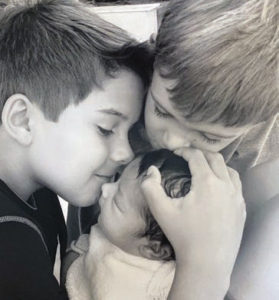
Ellis, left, and Owen meet Levi, Daddy’s little buddy. for the first time.
Owen says he was not nervous about the adoption at all, and now he doesn’t even see Levi as an adopted brother, but just a brother. Owen also loves having someone else to mess around with when he gets bored (which has to be so true now, during #QuarantineLife!).
What about Levi himself? As Amy said, he’s too young to understand many of the implications of his adoption. For now, his actions — those of a young boy who’s more than comfortable in his home — speak volumes. He bounces off the walls (more accurately, the couch) during this interview. When the photographer lets him go barefoot for the cover shoot, Levi yells, “YAAAYYY!”
When asked to name his favorite thing to do with his family, Levi said making s’mores in the fire pit at night. He also enjoys the pool: During a follow-up call with Amy, Levi can be heard in the background, urging the rest of the family in play.
‘We can no longer stay silent’
While Cliff and Amy don’t see Levi as any different than their older boys in terms of sonship, they do see the difference in his skin color. They celebrate that difference. They also know it will prove challenging.
“Having Levi has opened our eyes to how much we still have to grow in (terms of race relations),” Amy says. “I had this Pollyanna approach (before). I thought it wasn’t that complicated or bad anymore. God has brought some sweet friendships into my life that have shown me (the truth).
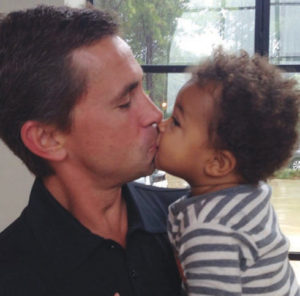
Cliff wondered if he’d be able to love an adopted child as much as his biological sons, but “God completely covers that,” he says. “I don’t look at Levi and think the word ‘adoption.’”
“I have learned that to say we are ‘colorblind’ is not kind. I’ve learned that through Levi. To say we’re colorblind is like saying, ‘I don’t see who God has created you to be.’ Kids do see color. They’re not colorblind. Levi knows his birth father is African-American and his birth mom is white.”
Amy says she and Cliff now are advocates for racial healing and reconciliation. “We feel like we can no longer stay silent.”
Cliff says he and Amy’s eyes have been opened to “the reality of what people (of color) have to deal with. … It’s something we have to prepare for, and prepare (Levi) for, upfront.”
That includes getting pulled over by police. Before adopting Levi, Cliff and Amy could hear about officer-involved shootings and give law enforcement the benefit of the doubt. But now, they have a child of color. They can no longer afford not to take it seriously.
“I have had friends say, ‘We’ve got to teach our white children what to do when they’re pulled over, because they’ll model it for (Levi if he’s with them),’” Amy says.
She’s grateful for the racial diversity present at Jackson Academy, where all three boys attend. “It’s important for us that Levi knows how to navigate black culture,” she says.
However, she and Cliff don’t necessarily hammer on race and adoption at every meal.
“We don’t talk about it unless (Levi) asks. We’re always open if he has questions, but we don’t want to always have adoption at the forefront.”
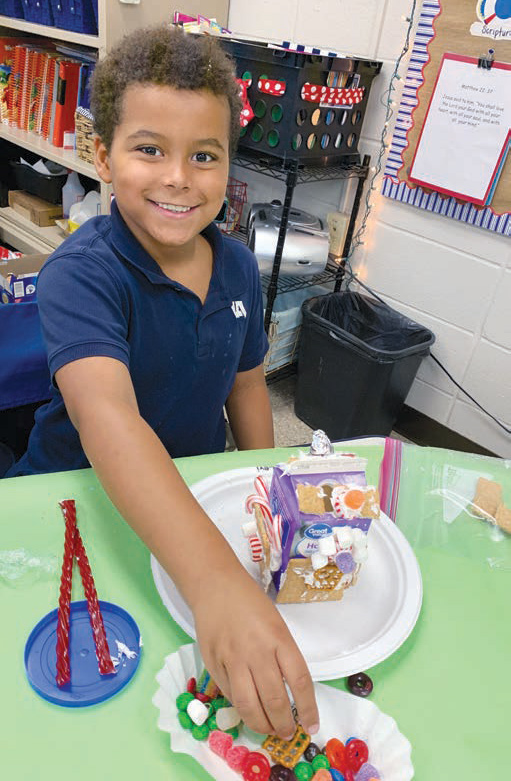
Amy says she’s grateful for the racial diversity present at Jackson Academy, where Levi and his brothers attend.
‘We wouldn’t change a thing’
Amy and Cliff hope there’s somebody out there who will read this story, realize it’s not too late to adopt, and persist even when it gets hard. Because it will.
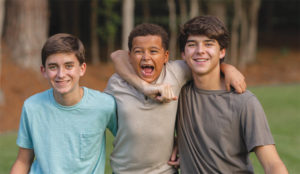
From left: Owen, Levi and Ellis Bates.
“But we wouldn’t change a thing,” Cliff says. “We wouldn’t want to go back to that easy place.”
“What we have gained and what our kids have gained is — we can’t put it into words,” Amy says.
The Bateses take scripture’s admonition “to visit the fatherless and widows in their affliction” very seriously — but they want to be clear, they don’t believe God calls everyone to adopt. He just calls us all “to look for ways we can love the most vulnerable,” Amy says.
And if He does call you to adopt?
“He will lead you each step of the way,” she says. “You will not miss God or miss the child He has for you, because as you walk in obedience, He will open the right doors.
“I think about Joseph, Jesus’ adoptive father. After he did what God said, then God gave him the next step. We get so caught up in needing the whole picture, but God doesn’t work that way. We are called to walk by faith, not by sight.”
